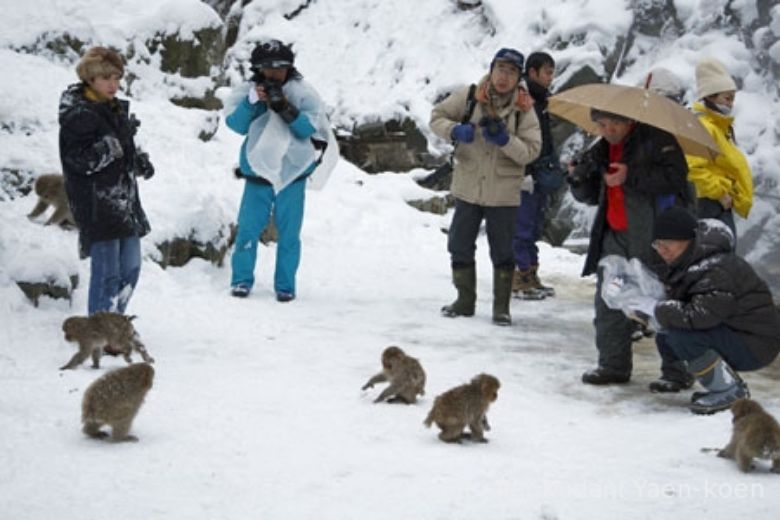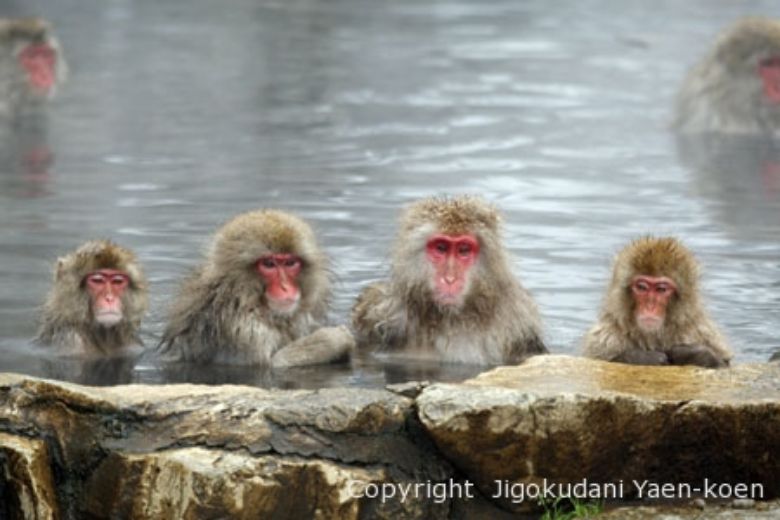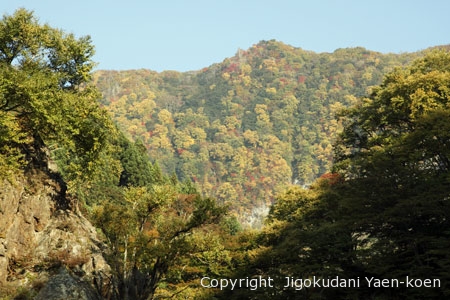About
About JIGOKUDANI YAEN-KOEN
The Jigokudani Yaen-koen is located in the Valley of Yokoyu River which takes its water from Shiga-Kogen of the Jyoshinetsu-Kogen National Park in the northern part of Nagano prefecture. Looking at the very steep cliffs and the fountains of hot water, people started to call the valley ‘Jigokudani (Hell valley)’. The altitude is 850 meters, winter seasons in Jigokudani is so harsh, for example, temperatures drops to 10 degrees below zero and snow falls over 1 meter. These severities compare favorably with those of Shimokita peninsula (Aomori pref.), which is the northernmost habitat of primates except humans.
Since the establishment in 1964, the Jigokudani Yaen-koen has been popularly known as the place where we can see the wild monkeys’ biology up close. Many thousands of people from all over the world have visited here to see monkeys, especially researchers and photographers. They made a lot of accomplishments in their research and photographing.
In 1970, a photograph of bathing monkeys was appeared on the front page of LIFE and was reported by the world media. And during the period of Nagano Olympics (1998), many people from the games visited here, such as athletes, Olympic officials and news media. We captured public attention with these topics.
Feeding is

Japanese macaques, or “snow monkeys,” inhabit mountainous forest regions throughout the entirety of Japan (except for Hokkaido and Okinawa). However, they live deep within these forests, in locations that are often dangerous for humans to visit, making encounters with them rare. Even if one were to spot a snow monkey in the wild, it would likely move away to a great distance or flee. Therefore, it is an animal seldom seen up close by humans. At Jigokudani Wild Snow Monkey Park, we attract them to our location through a regular feeding routine to enable regular observation.
Monkeys have excellent learning capabilities, and prefer the tastiest versions of foods that are to their liking, making them easy animals to please in terms of feeding. We give them food which is slightly better in quality than what they can find in the wild, which teaches them that going back to the same place will ensure a supply of tasty food and establishes a habit of routine visits. We also have people present at these feeding locations so that the monkeys learn not to see humans as a threat.
At the same time, we take measures to prevent them from taking excess nutrients at our park or losing their wild instincts. Our ultimate goal is observation of the monkeys, not supplying them with all the food they need. Some visitors also wish to feed the monkeys, but we prohibit feeding within our park, and we sell no animal feed to visitors.
Jigokudani Wild Snow Monkey Park strives to provide opportunities for observing snow monkeys in as natural an environment as possible. To this end, we allow humans and monkeys to share the same spaces freely, without any fences or barriers for separation.
The only place in the world where monkeys bathe in hot springs.
It’s not like monkeys have been bathing in hot springs for a long time.
After the success of artificial feeding, they stay in the park longer and have time to relax while waiting for feeding time. One day, a very young monkey accidentally learned to take the open-air bath of Korakukan. Maybe taking a hot bath during cold season was warm and comfortable for him. Other monkeys gradually became to behave in the same manner.
We built an open-air bath as monkeys’ private onsen because it is unfavorable from a hygiene standpoint if monkeys use the same bath with human. Since then monkeys inherit the behavior of bathing for generations.

The reason why monkeys take a bath is to protect them from the cold weather. So they are reluctant to take a bath during warm and summer season.
Bathing is just a part of their daily life. Some monkeys do not like to bathing. Eating and having communication with other monkeys are more important than bathing. For monkeys, ‘onsen’ is not must-have item.
Unlike human, they do not wash their body in the bath. They just feel good when they get warm their body in the hot bath. Some monkeys are about to fall asleep. On a very cold and snowy day, many monkeys take a bath, some of them stay in the bath for a couple of hours.


